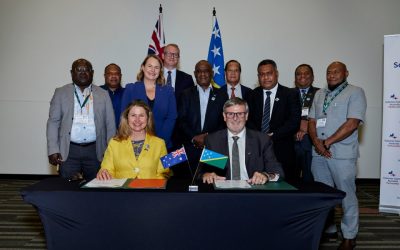In a climate of uncertainty surrounding inflation and interest rates in major economies and trading partners, a new World Bank report brings a ray of hope for developing Pacific nations. The report, titled “Pacific Economic Update: Recovering in the Midst of Uncertainty,” released recently, outlines that despite challenges, Pacific economies are poised to experience growth in 2023 and 2024. This resurgence is attributed to factors such as tourism recovery, post-disaster reconstruction, and robust infrastructure development.
According to the report, Pacific growth is anticipated to accelerate to 3.9 per cent this year, a notable jump from the 2 per cent recorded in 2022. This growth is expected to moderate to 3.3 per cent in the subsequent year, as the initial rebound from the post-COVID-19 scenario tapers off and the region progresses towards its long-term trend growth of 2.6 per cent.
Leading this positive trajectory is Fiji, which is anticipated to sustain its role as the harbinger of the Pacific’s recovery from the pandemic. Riding on a strong rebound of 18.6 per cent in 2022 and an estimated 7.7 per cent in 2023, Fiji’s resurgence is attributed to a revived tourism sector. Other Pacific nations also stand to benefit, with robust growth projected for Palau (10.3 per cent), Samoa (5.5 per cent), Tuvalu (3.9 per cent), and the Federated States of Micronesia (3.2 per cent).
World Bank Economist for the Pacific, Reshika Singh, said most Pacific countries are expected to reach their pre-pandemic GDP levels by 2024. Singh noted that for tourism-dependent economies, the path to recovery is closely tied to the revival of international travel. For other nations, the reopening of borders post-pandemic is anticipated to manifest in increased public investment and construction activities. Furthermore, steady remittance inflows are set to bolster consumption and growth, particularly in Samoa and Tonga.
Nonetheless, the report underscores potential challenges to the Pacific’s economic recovery. Factors such as fluctuating global commodity prices, geopolitical tensions, reduced growth among key trading partners, and the region’s vulnerability to natural disasters pose threats. Pacific nations heavily reliant on energy and food imports could face prolonged price pressures due to persistent international food and energy prices, potentially pushing vulnerable populations into poverty.
The report also shines a spotlight on the impact of labor migration, which serves as a driving force of development and a vital component of bilateral and regional economic relations. Many Pacific nations are among the top remittance recipients in the East Asia and Pacific region, reflecting the significance of remittances to local economies.
While labor mobility offers numerous benefits, it also presents challenges such as prolonged worker absences and dissatisfaction with earnings and health coverage. To maximize the benefits of labor mobility programs, the report suggests that Pacific countries must invest more in education and training, as well as enhance the business climate to generate better job opportunities domestically.
The “Pacific Economic Update: Recovering in the Midst of Uncertainty” covers 11 Pacific countries, including Fiji, Samoa, Tonga, and others. The report underscores the potential for growth and resilience in the Pacific region amidst a backdrop of global uncertainty.



